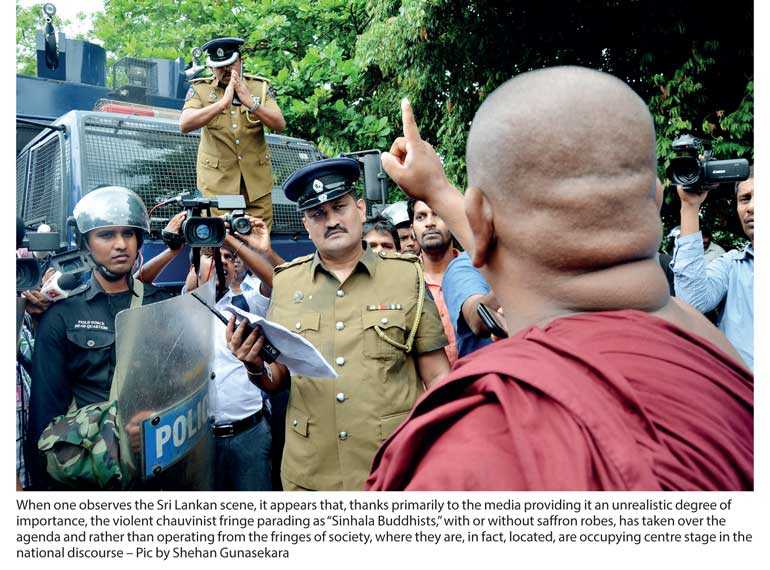Wednesday Feb 18, 2026
Wednesday Feb 18, 2026
Wednesday, 2 May 2018 00:00 - - {{hitsCtrl.values.hits}}

 Any sane individual living in Sri Lanka is increasingly faced with the fact that one’s disenchantment with and disengagement from the status quo in the “Land of 2,500 years of Sinhala Buddhist Civilisation” stems from the fact that the prevailing culture is one predicated on the exercise of power and authority without any pretence to the rule of law, natural justice and all those concepts near and dear to the hearts of those who believe that so-called Western Democratic Practice (WDP) is the means of ensuring the greatest good of the greatest number of the citizenry.
Any sane individual living in Sri Lanka is increasingly faced with the fact that one’s disenchantment with and disengagement from the status quo in the “Land of 2,500 years of Sinhala Buddhist Civilisation” stems from the fact that the prevailing culture is one predicated on the exercise of power and authority without any pretence to the rule of law, natural justice and all those concepts near and dear to the hearts of those who believe that so-called Western Democratic Practice (WDP) is the means of ensuring the greatest good of the greatest number of the citizenry.
WDP, a coupling of humane capitalism (if there is such a thing!) with those concepts shared by all the major religions/philosophies of the Northern hemisphere has been accepted by both the established democracies as well as those who have relatively recently shaken off the shackles of imperialism. Even if not the ideal, this is considered to be at least the most practical means of people realising their potential as complete human beings.
When one observes the Sri Lankan scene, it appears that, thanks primarily to the media providing it an unrealistic degree of importance, the violent chauvinist fringe parading as “Sinhala Buddhists,” with or without saffron robes, has taken over the agenda and rather than operating from the fringes of society, where they are, in fact, located, are occupying centre stage in the national discourse.
Where these monstrous individuals and organisations which seek to demean and destroy anyone not marching in lock-step with them have been very smart has been in projecting the views of a small violent and chauvinist minority as that of a majority. Of course this required a backboneless media to take it forward.
The societal foundation on which this has been built has been generated by the reaction to any effort to make fundamental changes in the manner in which we are governed. Historians documenting the seminal events in Sri Lanka’s history in the 20th Century conveniently forget the massive repression that was the reaction to the two insurgencies – that of 1971 and the other of the late eighties of the last century.
Whether that violent repression was an understandable, if not justified, reaction to attempts to overthrow a democratically-elected government is beside the point. What the governments of the day did succeed in doing was having the broad mass of the population accept such conduct as normal within democratic practice.
To go from the use of violence directed against “enemies of the state” to its use as a tool of day-to-day governance was purely a matter of time and opportunity.
The exercise of violence by the Security Forces of Sri Lanka (and various other Asian and African countries) to quell “civil disturbances” or “revolts,” with consequent “disappearances” ceased to provoke surprise as time went by. It was accepted as “business as usual, given the circumstances”.
While attention is periodically paid to the terrible brutalities of the second youth uprising in the late eighties, that of 1971 has been relegated to the level of irrelevance or inconsequentiality as it fades into the historical distance.
Suffice it to say that, if any lessons were really learned from the first Che Guevarist revolt, at least some of what followed in that of the late eighties could have been avoided. It is logical to draw the line that connects Government excesses in 1971 to the Janatha Vimukthi Peramuna’s (JVP’s) seeking to pre-empt the Government forces in that sphere when they next took up arms a second time.
But no, temporary political expediency and blind greed overrode every consideration.
The prevailing culture in Sri Lanka today is one that flows directly from the simple belief that “might is right,” that right being established through financial power.
Any “airy-fairy” considerations of civilised conduct are treated as irrelevant in a situation where the Golden Rule prevails: he that holds the gold makes the rules. And as a logical extension of that belief, those who have a little gold seek to make their stash larger and larger, both as insurance against being relegated to the “other” and as a means of consolidating one’s position within that milieu.
Violence and financial corruption seem to be the only growth industries in Sri Lanka. They are directly connected and gain a degree of (twisted) legitimacy by the reality that it is what prevails in the country. We are on a road to little less than total destruction of anything that resembles civility in governance and we do not have to journey very far to reach that particular nadir.
If that sounds like a prophecy of doom and gloom, so be it, because it is simply a statement of bald fact and to indulge in the semantics of political or economic analysis in the circumstances would constitute nothing but sophistry.
As Martin Luther King Jr. once said, “The ultimate tragedy is not the oppression and cruelty by the bad people but the silence over that by the good people.”
Has that silence been of such duration that the damage to this nation and its people is beyond repair?